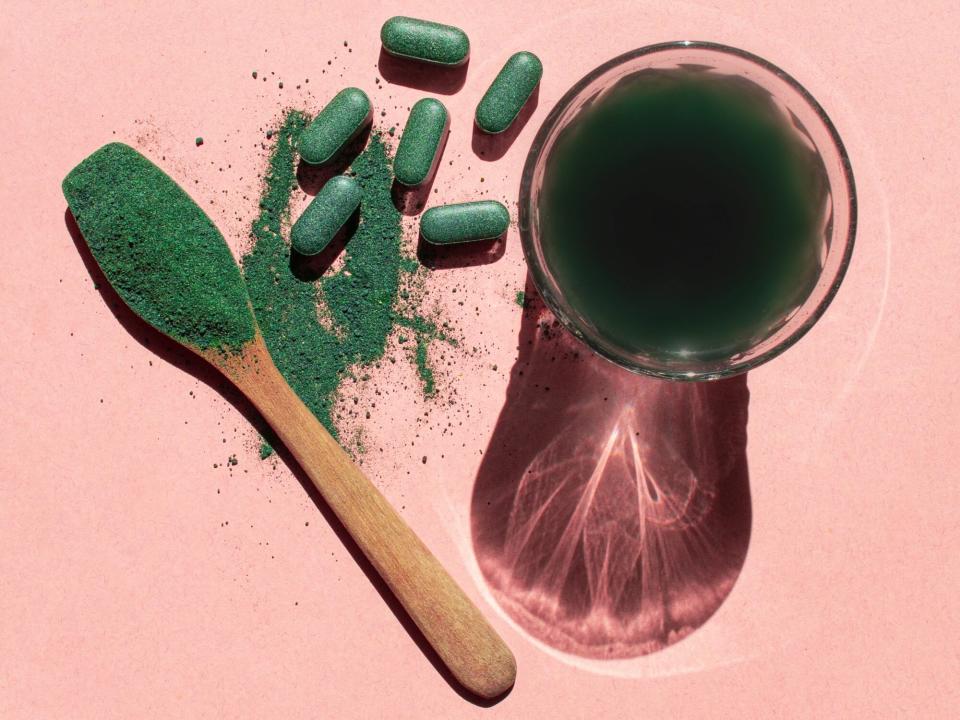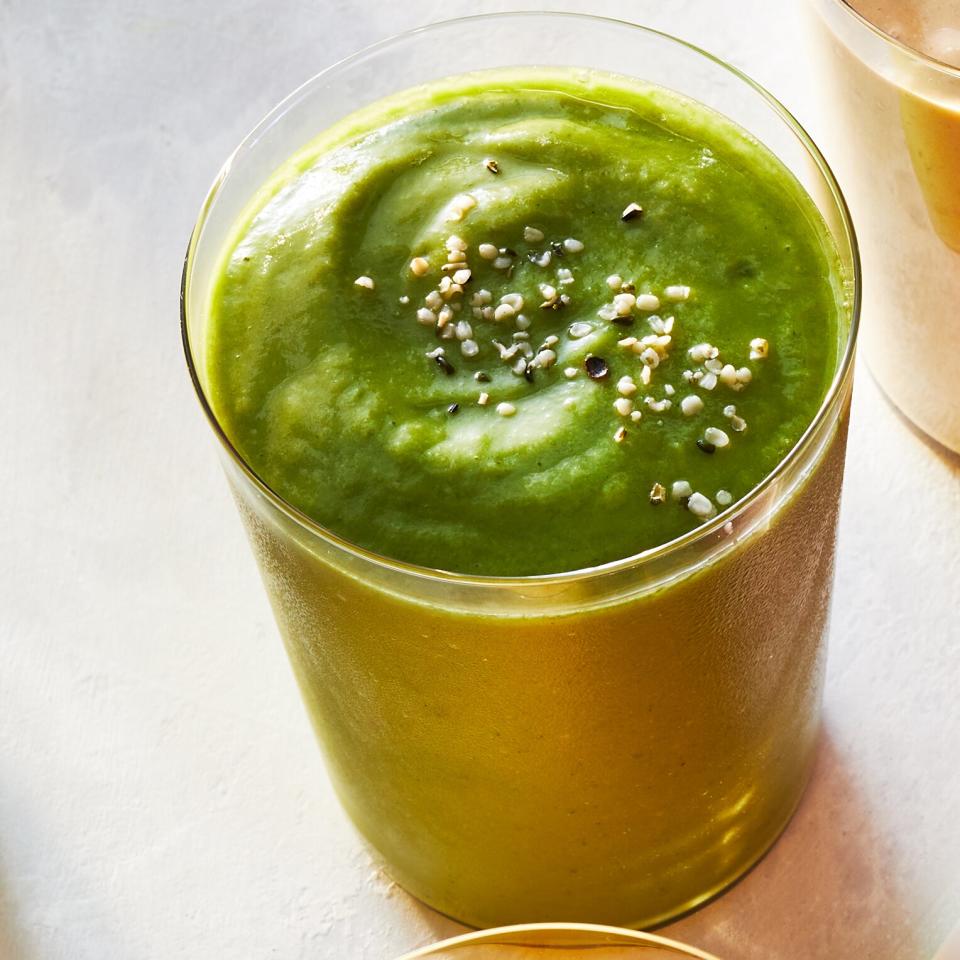4 Health Benefits of Spirulina—Plus, When You Should Avoid It
Spirulina, the blue-green algae you'll likely find in a powdered form that used to only be available in health food stores, is now proliferating supermarkets everywhere. Though it's been used as a food source for hundreds of years in cultures around the globe, it's only now becoming a health item du jour in the states. Here's what you need to know about spirulina, its health benefits, and how you can incorporate it into your diet.
History of Spirulina
Spirulina, or Arthrospira, is an algae that's been used across cultures for centuries. According to WebMD, the Aztecs used spirulina to treat various diseases, and perhaps used it as a supplement for the kingdom's messengers to sustain themselves on their marathon runs. Spirulina is used in much the same way today, and has even made its way to space as a dietary supplement for astronauts on NASA missions.
RELATED: The 30 Healthiest Foods to Eat Every Day
Now, it appears everyone wants to get their hands on this stuff. According to KBV Research, the global spirulina market is expected to reach $651 million by 2025. Spirulina can bloom and grow naturally in alkaline lakes around the world. However, companies are now also lab-growing this algae, which has an earthy, seaweed-like taste, in massive tubes to ensure there's enough supply for everyone.

Getty Images
Spirulina Nutrition Benefits
Emmie Satrazemis, RD, a board-certified sports nutritionist, registered dietitian, and nutrition director at Trifecta, believes spirulina deserves a spot in many a diet. As she points out, the naturally vegan food is packed with nutrients.
It's loaded with protein and vitamins
According to Satrazemis, spirulina "is a fairly protein-dense and low-calorie" food. Plus, "it contains notable amounts of calcium, niacin, potassium, magnesium, B vitamins, and iron."
Satrazemis also notes that 1 tablespoon of spirulina contains just 25 calories, 0.5 grams of fat, 1 gram of carbs, and 4 grams of protein.
RELATED: 8 of the Highest-Protein Foods Every Well-Balanced Diet Should Include
It may reduce your risk of developing macular degeneration
"Spirulina is also a notable source of phytonutrients—plant-based compounds that are thought to provide protective health benefits," Satrazemis continues. More specifically, spirulina is rich in a certain group of phytonutrients called carotenoids.
Per a Harvard University study, carotenoids are beneficial for both eye health and immune health. A pair of the most common carotenoids—lutein and zeaxanthin—are found in the retina and may decrease your risk of developing macular degeneration by up to 43 percent.
It's packed with brain healthy omega-3 fatty acids
Josh Schlottman, a certified personal trainer and nutritionist, notes that spirulina is thought to be one of the best sources of omega-3 fatty acids. In fact, spirulina boasts both omega-6 and omega-3 fatty acids in an approximately 1.5–1.0 ratio.
According to numerous studies, omega-3 fatty acids can help fight depression and anxiety, can ward off age-related mental decline and Alzheimer's disease, and promote brain health during pregnancy and early life.
Aside from giving your brain a boost, omega-3 fatty acids can also improve risk factors for heart disease, fight inflammation, and improve bone and joint health.
RELATED: 5 All-Star Foods That Are High in Healthy Fats
It fights cancer cells and inflammation
"There are also other nutrients present such as chlorophyll and beta-carotene which have been proven to fight cancer cells and protect vision from aging," Schlottman adds. "There are many benefits to spirulina, including the fact that it can help fight inflammation, boost your immune system, improve your gut health, and regulate blood sugar levels."
Should People Add More Spirulina to Their Diets?
Schlottman points out that there are countless benefits to adding spirulina to your daily diet. "Some of the most notable and important benefits include antioxidant protection, improved vision health, increased energy levels, low blood sugar regulation, and immune system strengthening/boosting," he explains. "Spirulina is also a great source of protein for vegetarians and vegans."
And the list goes on. Spirulina could also play a significant role in staving off malnutrition. According to a 2016 study published in Maternal and Pediatric Nutrition, malnourished children who received spirulina saw significantly more improvement in weight and height gain than children who only received regular supplements.
RELATED: What to Know Before Going Plant-Based, According to an RD
To get all these potential benefits, Satrazemis suggests the easiest route: "Add a scoop of spirulina to your morning smoothie or in other recipes for a small boost."
Reasons to Avoid Spirulina
There are some people who should avoid spirulina. According to Schlottman, "Those with anemia or low blood levels may want to stay away from it because of its high iron content. It can also cause nausea in those without a healthy stomach. People on certain medications might need to avoid spirulina as well, so be sure to talk with your doctor before adding spirulina to your daily diet."
Per Live Science, those with certain autoimmune conditions such as multiple sclerosis, lupus, and rheumatoid arthritis may want to avoid spirulina, as it could worsen symptoms. Spirulina may also weaken the effect of immunosuppressants. Pregnant or breastfeeding women should also avoid spirulina, as there is a lack of safety information regarding expectant and nursing moms ingesting it.
RELATED: This Is What Happens to Your Skin When You Have a Baby
When to Buy Spirulina and How to Store It
Spirulina is available in many forms, including capsules and powders. It's also baked into other items such as bars, blended into smoothies, and can even act as a topper to popcorn. Spirulina can be found in grocery stores around the world, throughout the year.
It's best to store spirulina tablets and powder in the refrigerator. Though it doesn't technically go "bad", its nutritional qualities will degrade over time. Thus, it's best to consume spirulina within a few months of opening it.
Spirulina Recipes
As you may have guessed, if you're looking to incorporate some spirulina to your diet, you can add the nutritious algae to just about anything. Keep reading for some healthy recipes that could benefit from a dash of spirulina!
RELATED: 18 Easy, Healthy Dinner Ideas Your Whole Family Will Love
Raspberry Smoothie Bowl
Blend a teaspoon of spirulina into this vibrant smoothie bowl that's made with a banana, frozen raspberries, almond milk, vanilla extract, and more. If you're not sure if you'll like the earthy taste of spirulina, this is a great way to give it a try as you get used to its bold flavor.

Chickpea "Cookie Dough" Bites
These no-bake "cookie dough" bites are made with chickpeas (yes those chickpeas) but taste eerily similar to oatmeal raisin cookie dough. If you want to give your bites a bit of an earthy flavor, which will complement the chickpeas, add a dash of spirulina to the recipe.

Good Morning Green Smoothie
This smoothie is already green and packed with healthy fruits and vegetables (think apples, spinach, and Persian cucumbers), so chances are you won't even notice if you add a teaspoon or two spirulina to the mix.
RELATED: 20 Delicious Smoothie Recipes for the Perfect Blend Every Time


 Yahoo Finance
Yahoo Finance 